A new survey sponsored by Partners for Automated Vehicle Education finds Americans continue to be wary of fully autonomous vehicles, but that education and firsthand experience with automated driving technology can lead to greater trust.
The skepticism and mistrust found in the PAVE poll appear to be rooted in a lack of knowledge about and exposure to AVs, rather than specific incidents like the 2018 crash of an Uber autonomous test vehicle in Tempe, AZ. Not only do the majority of Americans say that more education and experience with AVs would improve their trust in the technology, but personal experience with advanced safety features available for sale today is strongly correlated with higher levels of familiarity and confidence with all levels of automated driving technology.
“The results of this survey confirm that autonomous vehicles face major perception challenges, and that education and outreach are the keys to improving trust,” said Tara Andringa, Executive Director of PAVE. “These insights provide both motivation and direction to our effort to confront this educational challenge.”
In addition to a national survey of 1,200 American adults, the PAVE poll includes a first-of-its-kind survey of 200 Americans with mobility issues that affect their daily lives – a community that could benefit from increased mobility through highly automated vehicles. The poll found this community is somewhat more positively disposed toward key AV concepts and somewhat more knowledgeable about AVs than the general public – and their optimism about the future of AVs is similar to that of the general public.
“These findings demonstrate that blind Americans and others with disabilities are enthusiastic about the potential of automated vehicles to enhance our mobility and independence,” said Mark Riccobono, President of the National Federation of the Blind. “We look forward to assisting in the planned public education efforts and continued research that will be guided by this recent polling data.”
PAVE hosted a virtual panel to discuss the survey and its findings on Wednesday, May 20 with members from the National Safety Council, United Spinal, and Voyage. Click here to watch the full recording of this frank discussion on the challenge of AV perception.
PAVE is a diverse coalition that includes industry and nonprofit partners. The coalition’s mission is to improve public understanding of advanced vehicle technologies in order to maximize the potential benefits in safety, mobility and sustainability.
Click here to download a PDF of the PAVE Poll Fact Sheet.
Poll Information: SurveyUSA polled 1,200 adults across the United States between 2/27/20 and 3/5/20 on behalf of PAVE. 678 of these respondents reported owning cars with advanced driver assistance system (ADAS) features and were asked an additional battery of questions. The margin of error is +/- 2.5 percentage points for the entire sample. Additionally, the survey oversampled 200 adults with disabilities that might affect their mobility; the margin of error for this group is +/- 6.2 points.
AV Perceptions and Attitudes
The poll shows that Americans are skeptical of current AV technology, but they are slightly more optimistic about the availability of safe AV technology in the future:
Nearly three in four Americans say AV technology is “not ready for primetime.”
48% of Americans say they “would never get in a taxi or ride-share vehicle that was being driven autonomously.”
58% think safe AVs will be available in ten years, and 20% believe they will never be safe.
Only 34% of Americans think “the advantages of AVs outweigh any potential disadvantages.”
Only 18% of Americans agree with the statement “if there was a website to get on a waiting list for the first AV, I’d put my name down.”
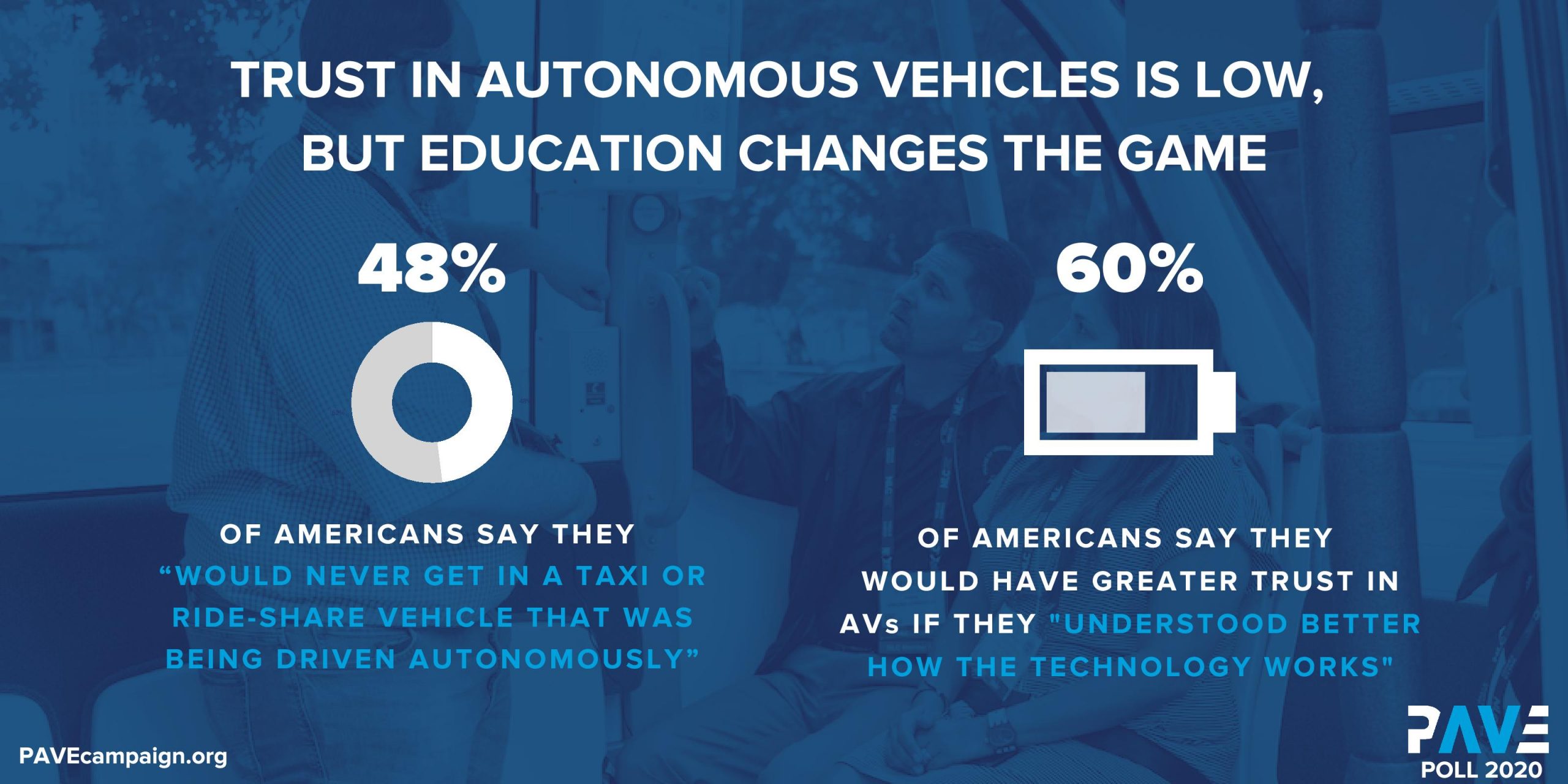
These attitudes do not seem to be solely tied to publicity of high-profile incidents involving automated driving, such as the 2018 Uber crash in Tempe, AZ, or crashes involving Tesla’s Autopilot feature.
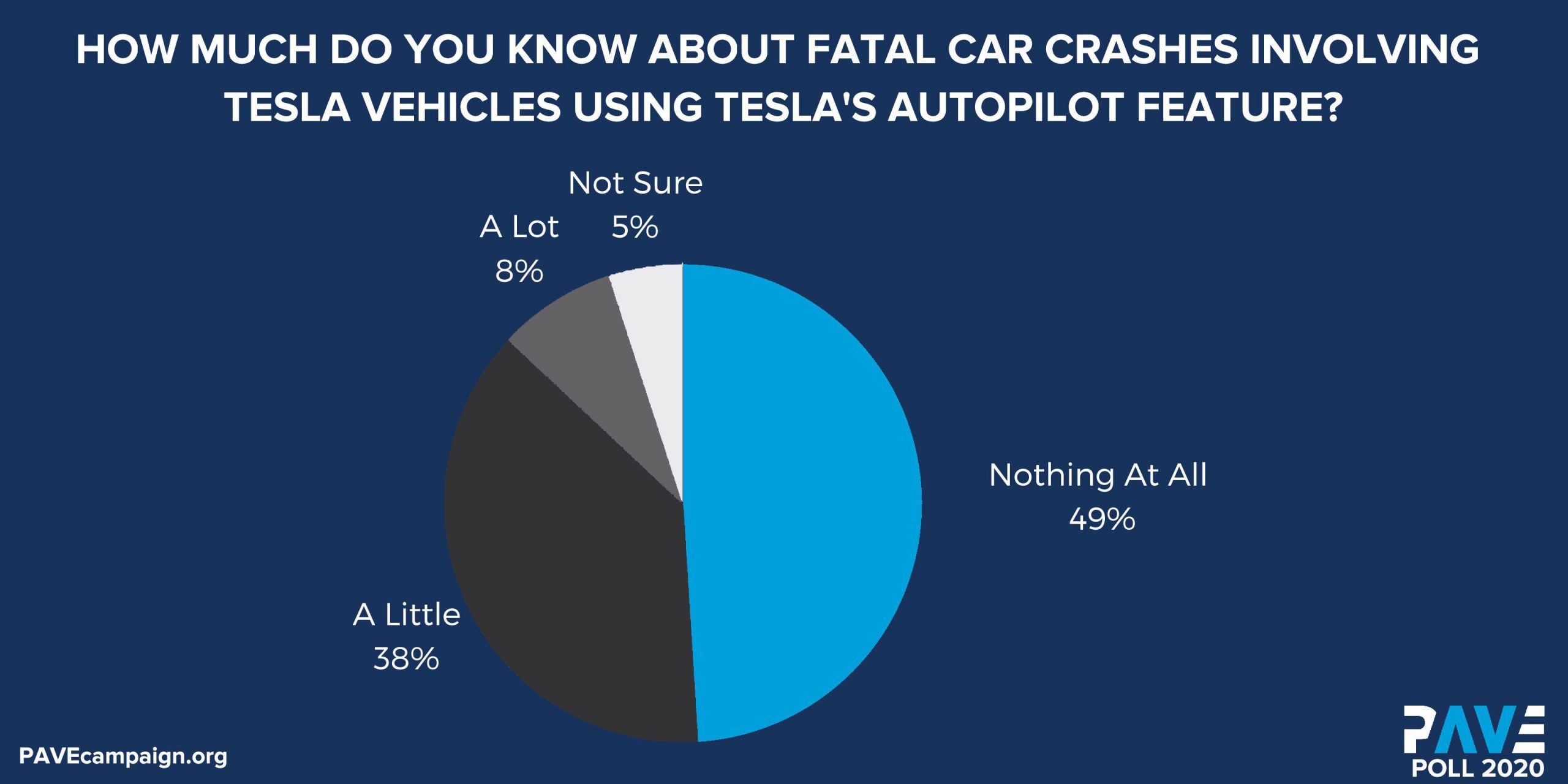
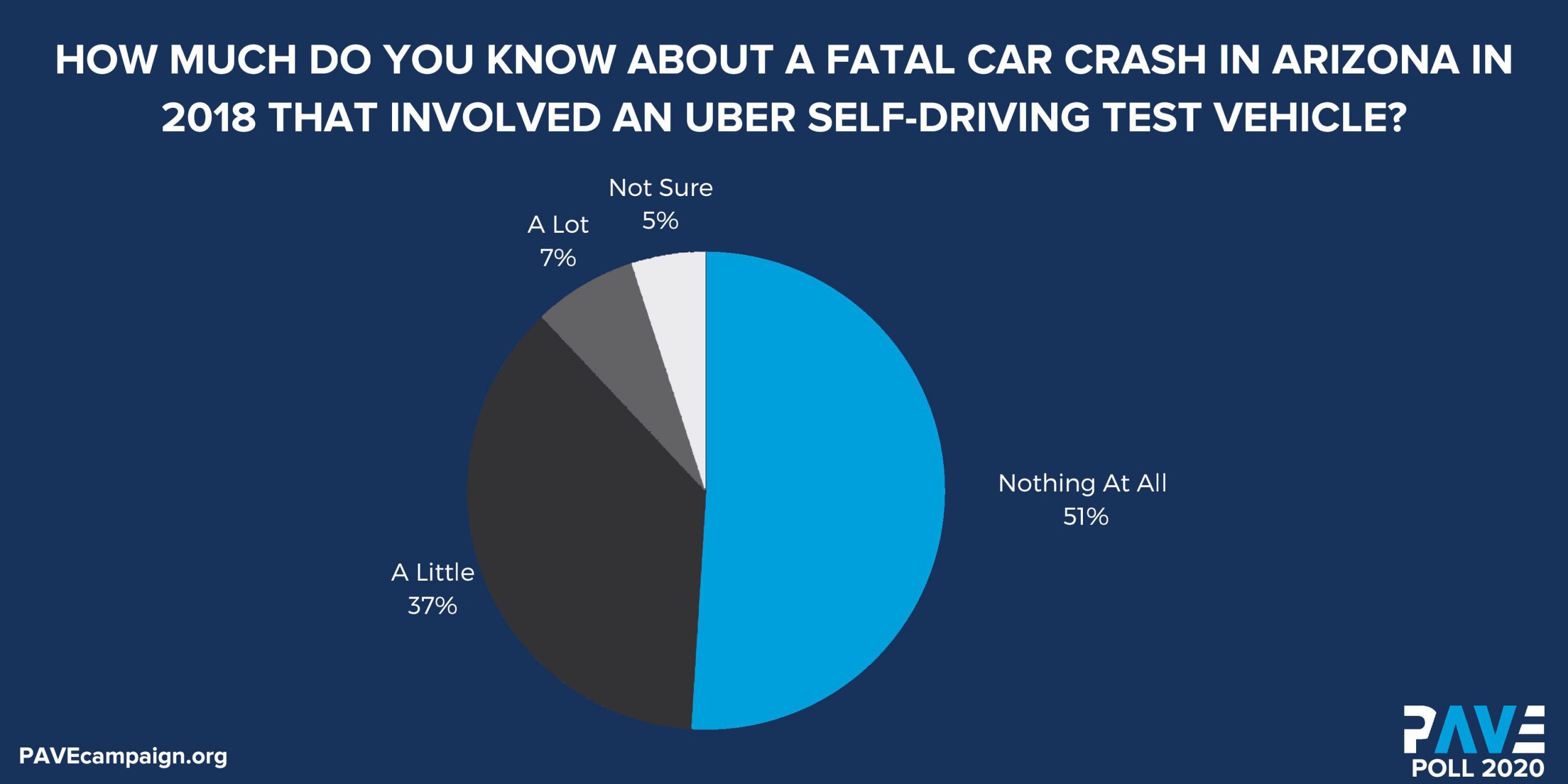
Americans indicated that additional knowledge of the technology and increased exposure to the technology would increase their trust in AVs:
60% said they would trust AVs more if they better understood how the technology worked, compared to 23% who did not.
58% said they would have greater trust in AVs if they could experience a ride in one, compared to 24% who did not.
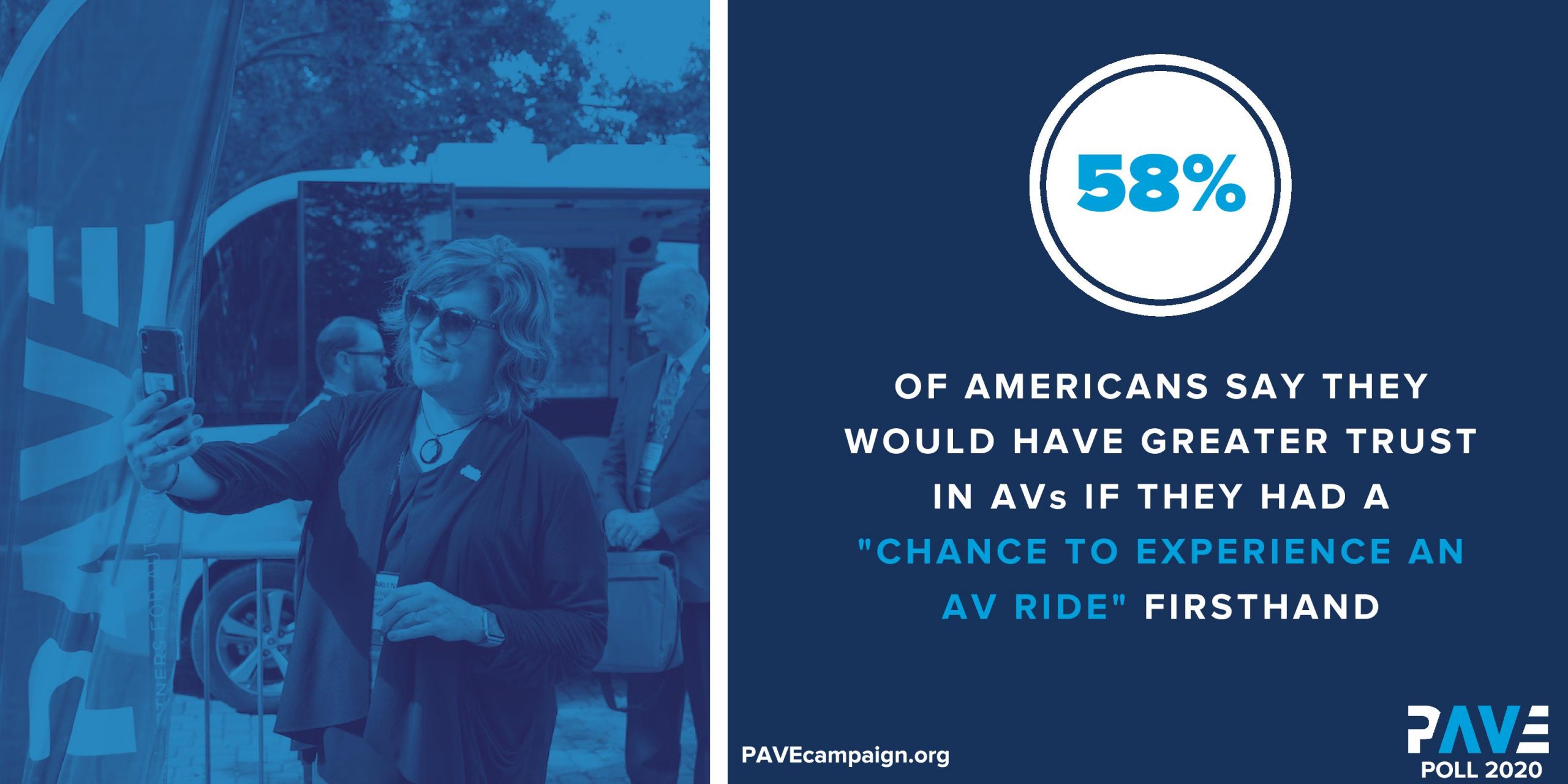
To download the PAVE Poll briefing “Understanding the AV perception challenge”, click here.
The relationship between ADAS and Autonomy
Americans are generally positive about ADAS features, and those who report owning a vehicle with ADAS features reported having greater knowledge about AVs and showed more favorable sentiment toward AVs and more confidence in their eventual arrival:
Americans who own vehicles with ADAS features agreed with the statement “the advantages of AVs outweigh any potential disadvantages” at above-average rates (average=34%), with the highest percentages correlating with ownership of more advanced features like Active Parking Assist (58%), Heads-Up Display (54%) and Lane Keeping Assist (51%).
75% of Americans who own vehicles with ADAS agree that they “can’t wait to see what new safety features will be in my next vehicle” and “will feel safer on the road when I know that most other vehicles have enhanced safety features.”
82% of drivers with ADAS-equipped vehicles said they “have a good understanding of how the safety technology in my car works” whereas all respondents rated their level of knowledge about AVs quite low (-21, on a scale of -100 to 100).
Americans who own cars with more advanced ADAS features gave their knowledge of AVs some of the highest ratings in the survey, such as Remote Parking (29), Driver Monitoring (21), and Active Parking Assist (12). In contrast, reported knowledge about AVs was even lower than average among respondents who do not have vehicles with any ADAS features (-32) or were unsure if their vehicles had such systems (-44).
Reactions of all Americans to the idea of “a vehicle with safety systems that support a human driver, but with the human driver always in full control” were significantly more favorable (49) than reactions to the idea of a “self-driving car” (3), “autonomous vehicle” (-3) and “driverless car” (-13).
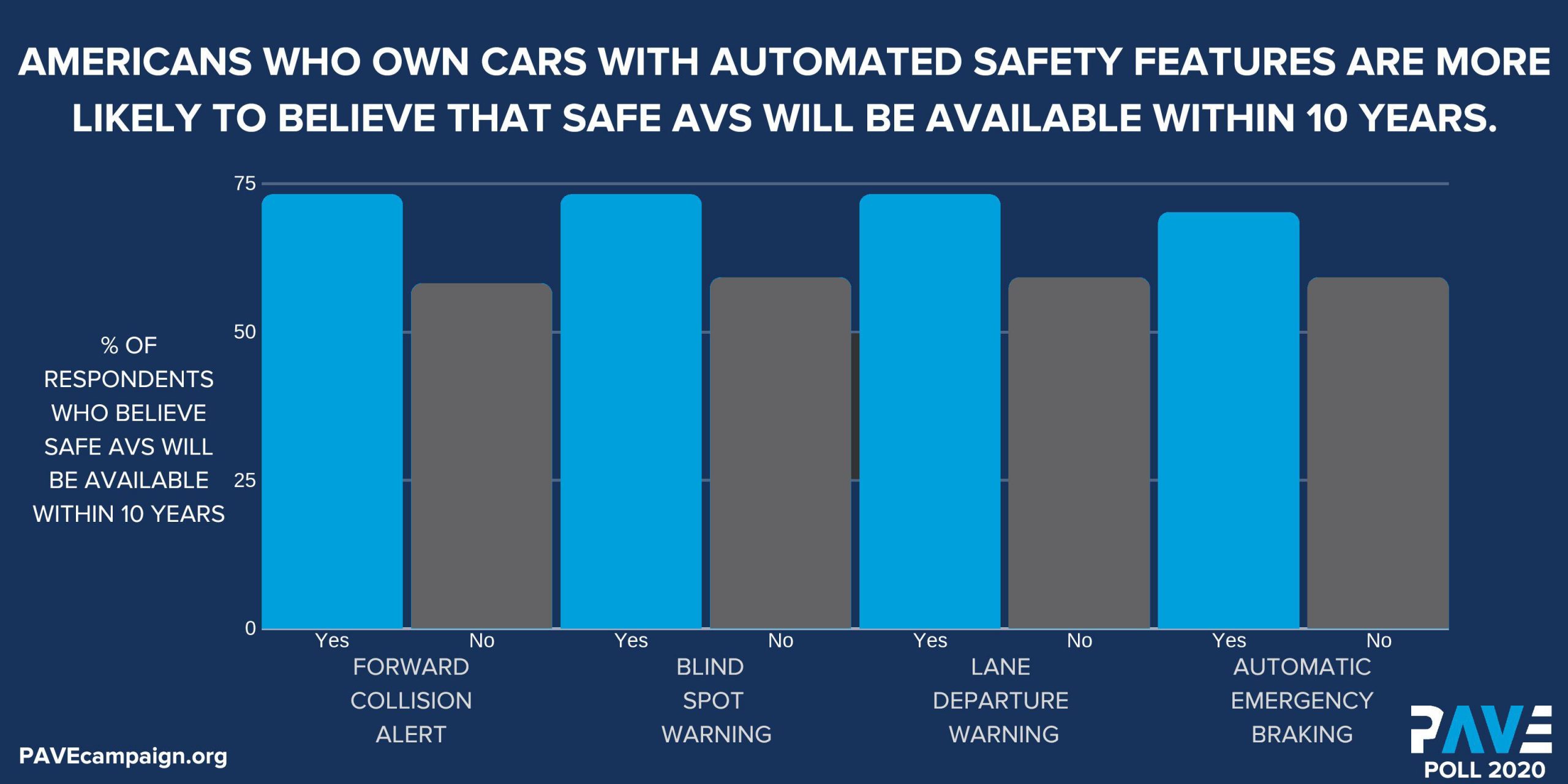
While respondents were positive about the safety benefits of ADAS features, they reported confusion regarding those features, and the survey shows signs that ADAS features may contribute to misperceptions about AV technology and what is commercially available today:
39% of respondents admitted that “I am confused by all the different names of advanced safety features.”
Only 55% of respondents correctly stated that it is not “possible for me to own a completely driverless vehicle today,” with 19% stating that it is possible and 26% answering “not sure.”
Ownership of vehicles with more sophisticated ADAS features made respondents much more likely to believe that “it is possible for me to own a completely driverless vehicle today,” with 59% of Remote Parking System owners, 47% of Driver Monitoring System owners and 44% of Automatic Emergency Braking answering in the affirmative.
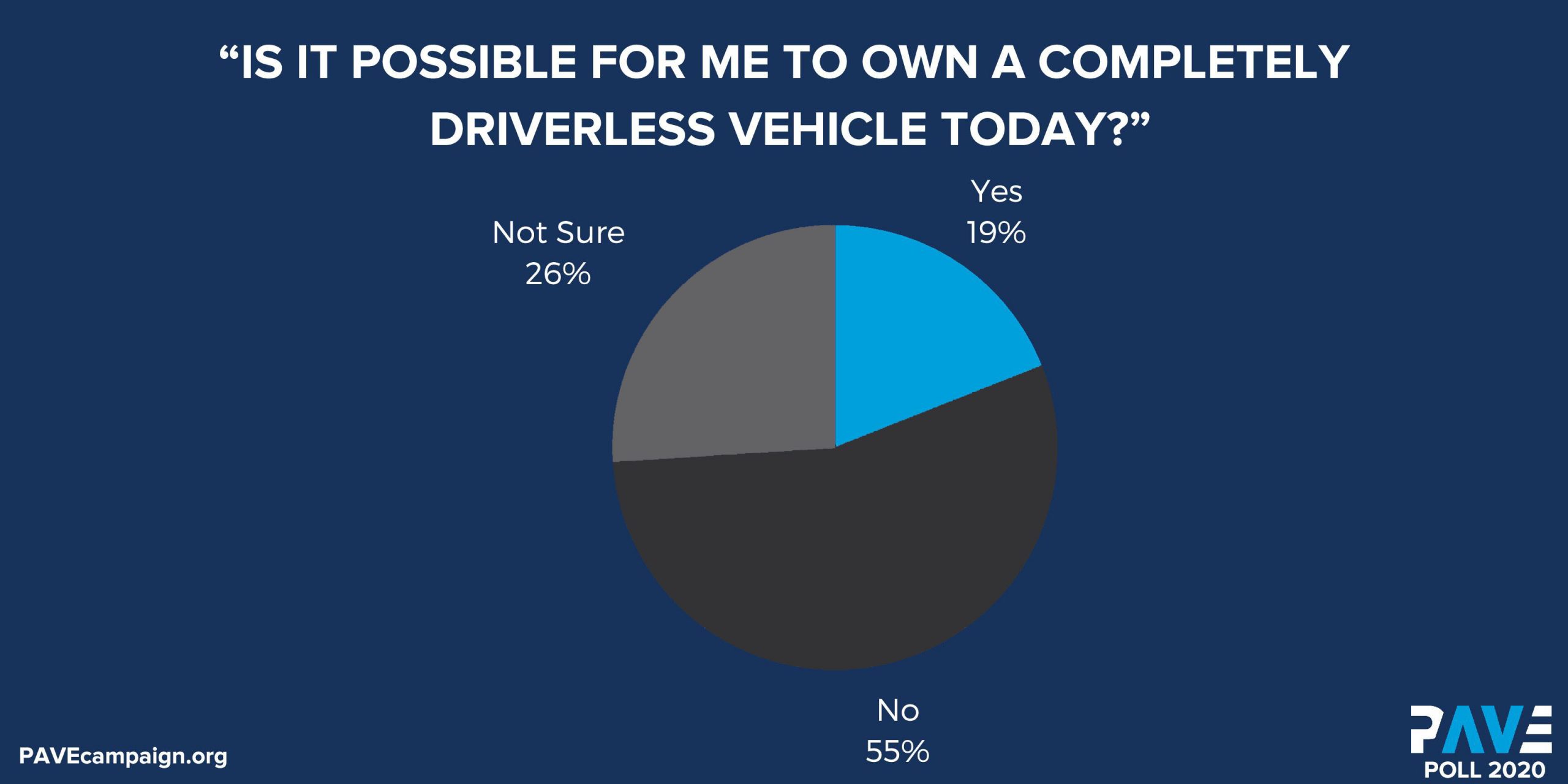
To download the PAVE Poll briefing “The Real Relationship between ADAS and Autonomy”, click here.
AV perceptions of Americans with disabilities
The poll is a groundbreaking study of perceptions of automated driving among individuals who reported disabilities that may affect mobility. Findings include:
People with disabilities reported their knowledge of AVs slightly higher than the general public average, but still in the negative half of the -100 to 100 scale (-13, compared to -21 for the general public).
People with disabilities were more likely to agree that “the advantages of AVs outweigh any potential disadvantages” (43% vs 34%).
This group reacted more favorably to “a vehicle with safety systems that support a human driver, but with the human driver always in full control” than the general population (58 compared to 49 for the general public, on a -100 to 100 scale).
This group was more likely to agree that “AVs will help mobility-challenged individuals go places they cannot get to today” than the general public (76% vs 70%).
This group was slightly more likely to agree with the prompt “AVs may allow blind persons to drive for the first time” than the general public (56% vs 50%).
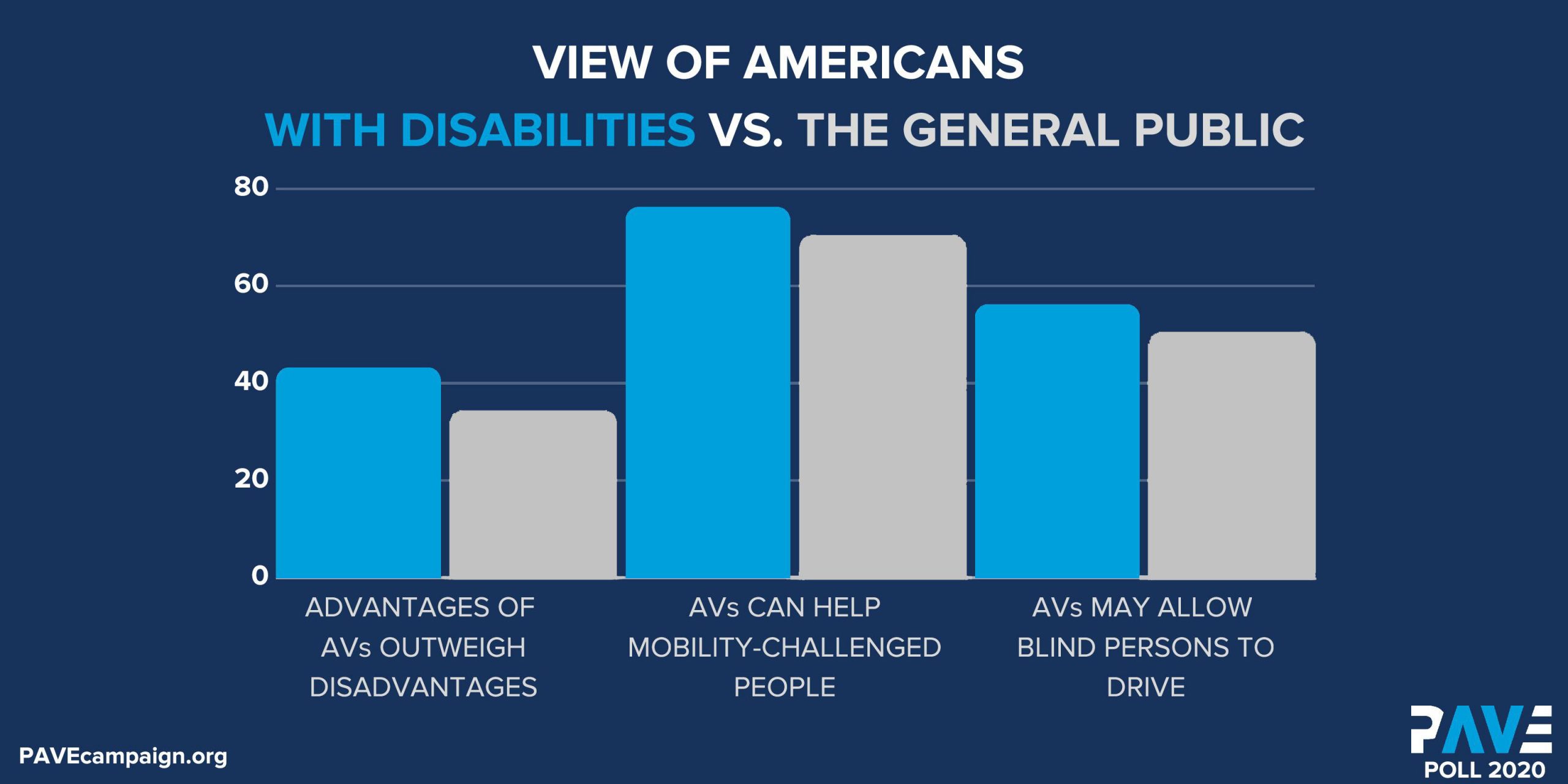
To download the PAVE Poll briefing “Understanding how personal mobility issues affect AV perceptions”, click here.
Americans’ views of AV policy and regulation
Americans indicate relatively low levels of confidence in both AV technology and in the auto industry’s ability to self-regulate, while ranking more education, more personal experience and government approval as measures that could boost their confidence in AVs:
The role of regulation
54% of respondents would trust AVs more if they had to receive government approval like a human driver’s license, compared to 26% who would not.
36% of respondents say the auto industry is able to regulate itself on AV safety, compared to 34% who say it is not and 30% who are unsure.
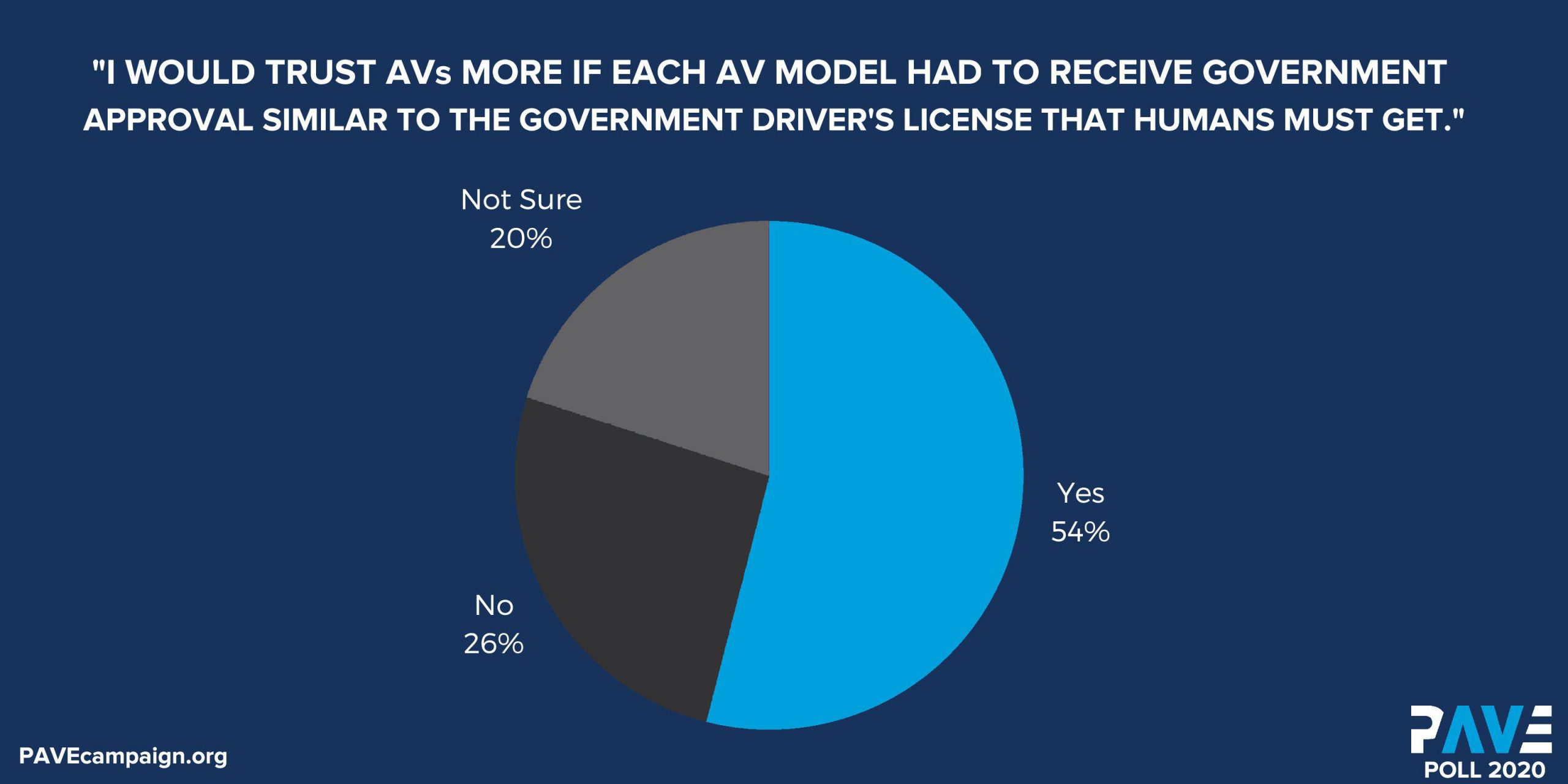
Building trust
25% of respondents say they would “trust AVs more if they only traveled at less than 25 MPH” whereas 51% disagree and 24% are not sure.
51% of respondents agree with the statement “I would trust AVs more if, at first, they were used to move cargo, not humans” while 27% disagree and 22% are unsure.
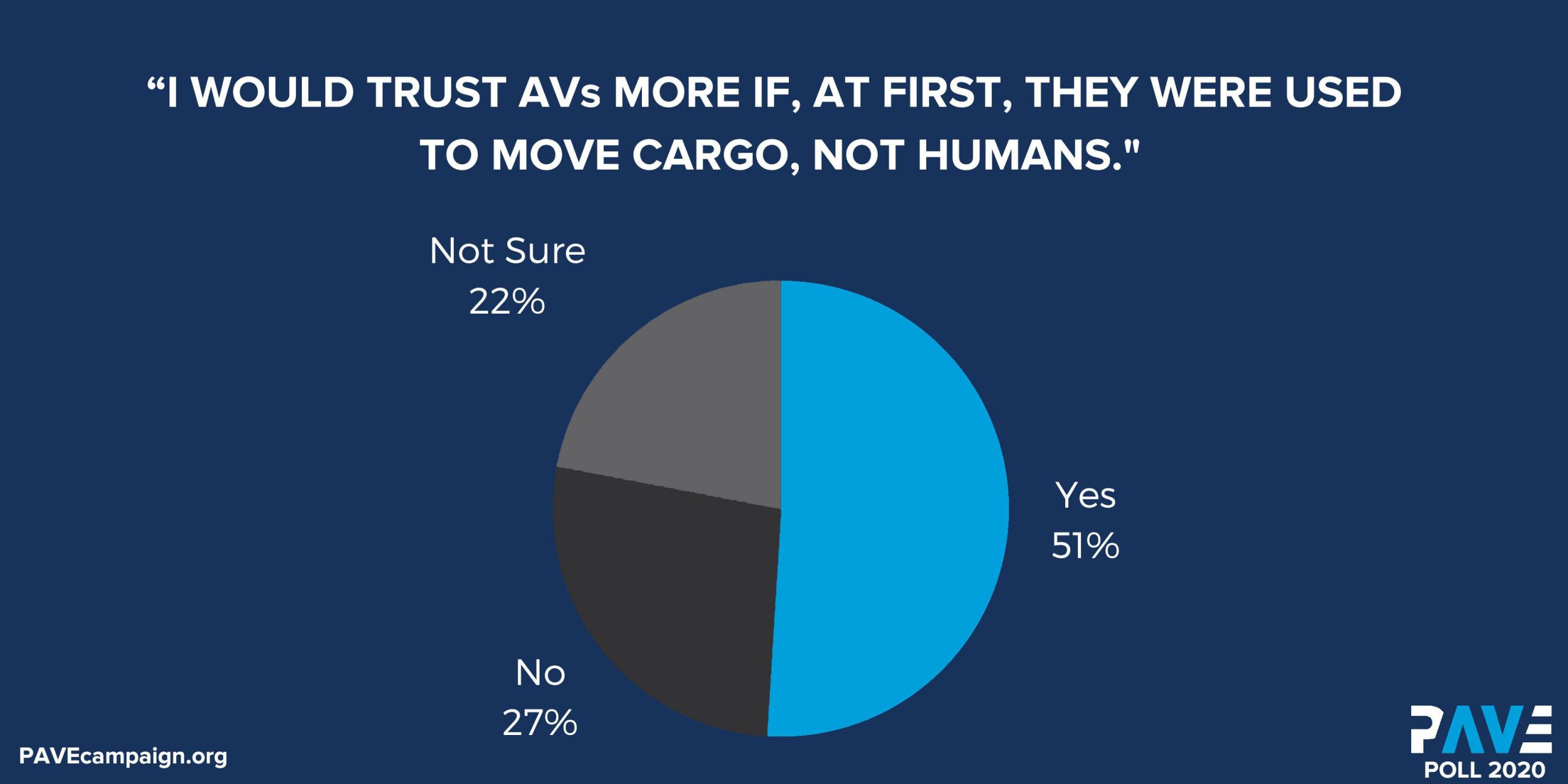
Congestion impacts
45% of respondents believe AVs will not reduce the need to widen existing highways and build new ones, compared to 22% who believe they will and 33% who are not sure.
37% believe “AVs will get me where I need to go in less time,” compared to 28% who disagree and 35% who are not sure.
Respondents were evenly split on the question of whether “AVs will reduce highway traffic jams,” with 34% saying they will, 33% saying they won’t and 33% are unsure.
44% agree with the statement “AVs will help traffic on city streets flow more smoothly,” while 24% disagree and 33% say they are not sure.
Cost impacts
Respondents were split on whether “driving an AV will cause the cost of my auto insurance to go down,” with 29% saying it would, 30% saying it wouldn’t and 41% were not sure.
33% of respondents say “AVs will lower the cost of getting goods to market, resulting in lower prices” whereas 29% disagree and 39% say they are not sure.
Employment
53% of respondents believe that “AVs will take away jobs from taxi drivers and ride-sharing drivers,” with 25% disagreeing and 21% unsure.
42% say “AVs will take away jobs from over-the-road truckers,” 32% disagree and 25% are unsure.
Overall societal benefits
When asked what the most compelling case is for why AVs may change society for the better, Americans said safety (36%), increased mobility options (31%) and sustainability of the transportation system (9%).
45% of respondents believe “AVs can save lives”, with 19% disagreeing and 36% unsure.
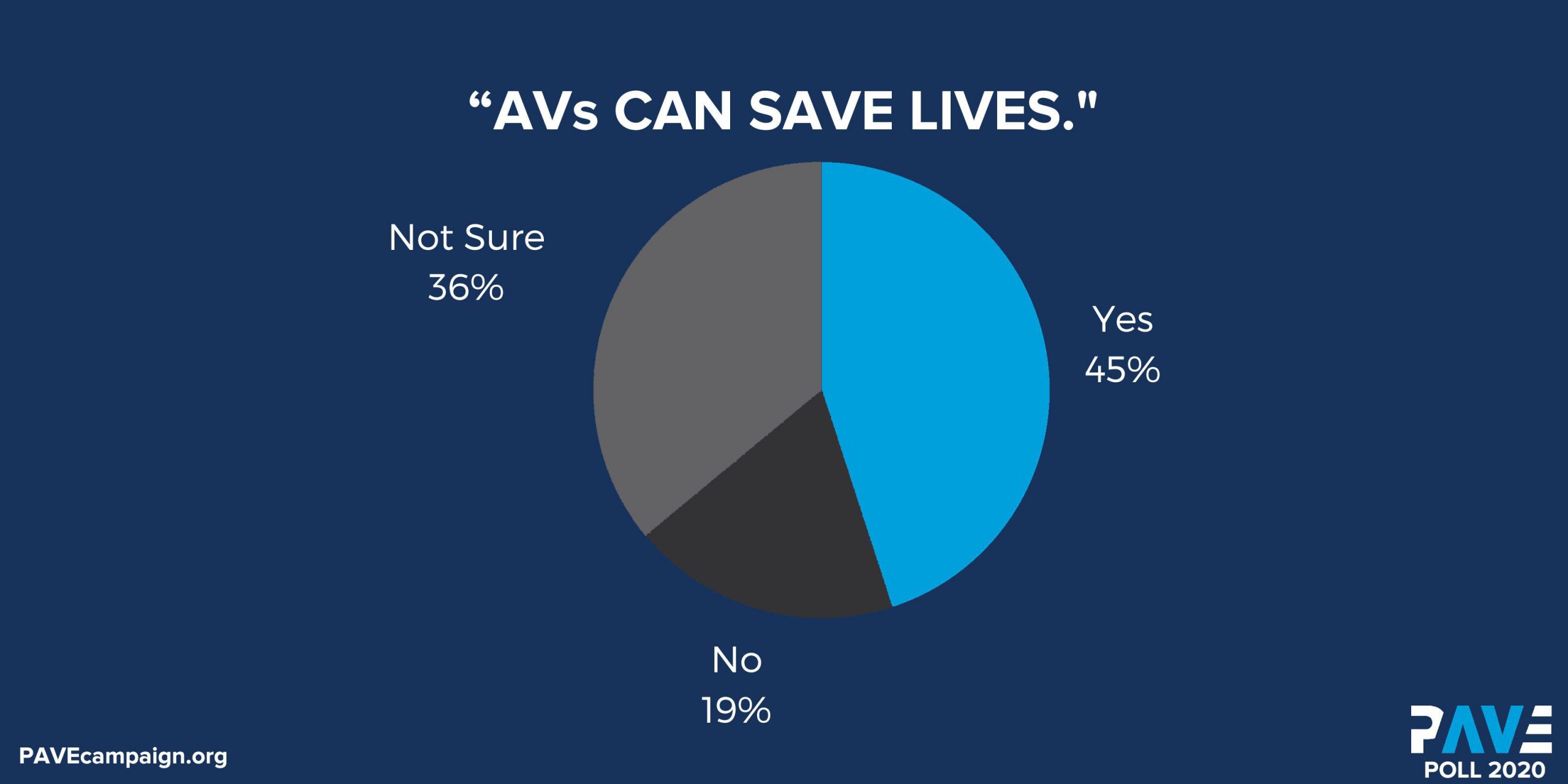
To download the PAVE Poll briefing “Americans’ views of policy and regulation”, click here.


